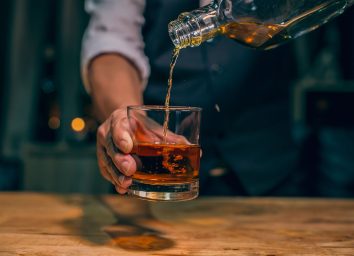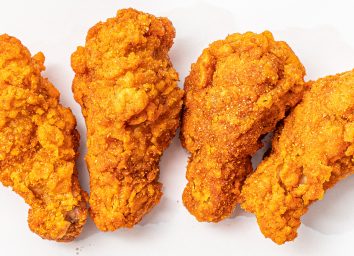Popular Drinks That May Cause Lasting Damage to Your Liver, According to Experts
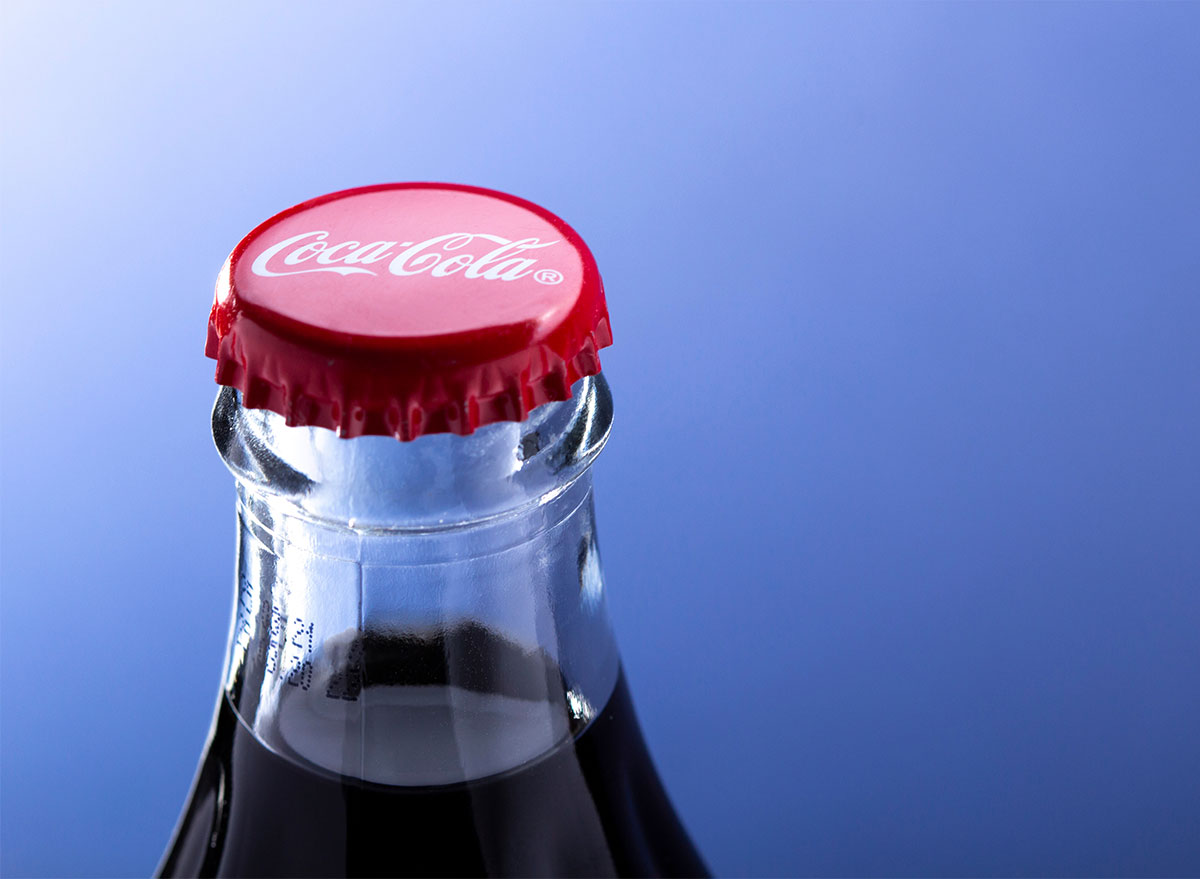
We worry about our hearts stopping. We fret that we're losing our marbles. Our stomachs send us so many daily signals that we can never forget it's there, pressing against our belt buckle. But the liver? Whoever thinks about that 3-pound, reddish-brown blob that sits on top of the stomach, just under the diaphragm?
Your liver deserves better. It's a life-giver and our natural detoxer. Without it, you'd be a goner. This unsung hero is one of your body's workhorse organs, multitasking no fewer than 500 important functions.
"Your liver is a 'detox center' of your body—removing toxins and other harmful substances," says Waqas Mahmood, MD, a physician at the Hospital of the University of Pennsylvania.
The liver also produces bile, which helps with digestion. It metabolizes proteins, fats, and carbohydrates, it stores vitamins and minerals, and is responsible for immunological functions, too, among others.
But let's focus on its filtering function, clearing your blood of the drugs you take and the poisons you ingest. You're probably aware that one of the most common of those poisons is alcohol and that heavy drinkers are at increased risk for cirrhosis, liver failure, and liver cancer. Studies show that repeated binge drinking can lead to severe forms of liver damage.
"Any beverage containing alcohol will adversely affect the liver by causing inflammation, fat accumulation, and potentially fibrosis (scar tissue) formation," says biochemist Barry Sears, PhD, president of the Inflammation Research Foundation, and author of the Zone Diet series.
Women have a significantly higher risk of developing alcoholic liver disease than do men, according to the Mayo Clinic. One British study that followed women found that healthy women who reported drinking alcohol daily—but not with meals—were more than twice as likely to develop cirrhosis compared to those who did not drink daily.
Even non-drinkers can develop fatty livers. Non-alcoholic Fatty Liver Disease (NAFLD) can be triggered by being overweight or obese, being insulin resistant, and having high levels of triglycerides in the blood. A growing body of research suggests that too much sugar, primarily from sugar-sweetened beverages, may cause non-alcoholic fatty liver disease, which affects 30% of U.S. adults, according to the Journal of Hepatology.
NAFLD can develop into an aggressive inflammatory form of fatty liver disease called nonalcoholic steatohepatitis, that may advance into similar damage caused by heavy drinking, namely cirrhosis, and liver failure.
"Sugar, especially fructose, is converted into fats in your liver," says Dr. Mahmood. "Part of that fat is converted into triglycerides and gets into the bloodstream while the rest remains in your liver. If this situation continues over time, it can cause non-alcoholic fatty acid liver disease."
By now, you may be thinking more about your liver than you ever have before. So, here are some popular drinks you might consider limiting in deference to that unsung hero under your ribcage. And for even more drinking tips, be sure to read up on our list of 108 Most Popular Sodas Ranked by How Toxic They Are.
Sunny D Tangy Original
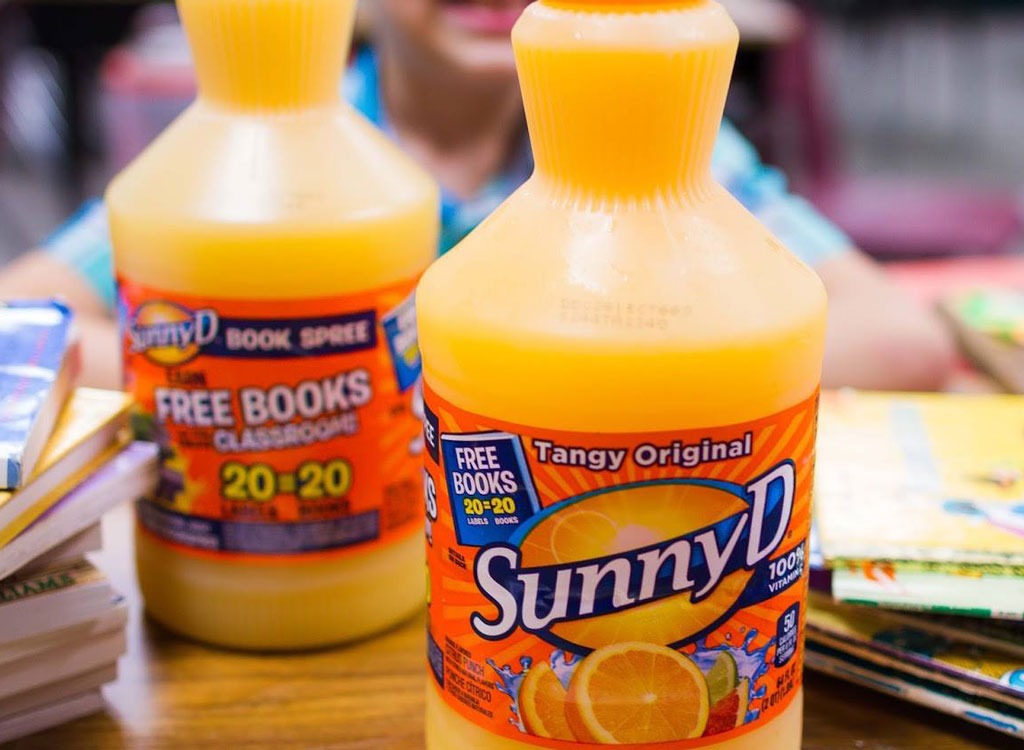
This orange-flavored citrus punch boasts 5% real fruit juice. The rest of the drink is water and high fructose corn syrup (HFCS), labeled as the first and second ingredient on the nutrition label. HFCS is a lot cheaper (and sweeter) than sugar, so food manufacturers love it. But your liver is not a lover of HFCS.
While several observational studies have linked HFCS to fatty liver disease, scientists were unsure just how fructose might cause NAFLD. Recently, National Institutes of Health scientists explored fructose's role by giving groups of mice either a high-fructose diet or a control diet of glucose, the sugar that cells use for energy, for several months. The researchers found that the mice fed high fructose had inflamed livers. Experiments showed that HFCS caused intestinal damage that leaked toxins into the bloodstream of the mice that prompted the production of immune system proteins. Those proteins boosted levels of enzymes that convert fructose into fatty deposits on the liver.
"When your liver is inflamed, it does not work properly," says nutritionist Jay Cowin, RD, with ASYSTEM and founder of FunctionalU Health Consultants. "If your body can't eliminate toxins they go back into your bloodstream and the effects can be deadly."
Here are 23 Surprising Foods That Contain High Fructose Corn Syrup.
Coke, Pepsi, and other Sugary Sodas
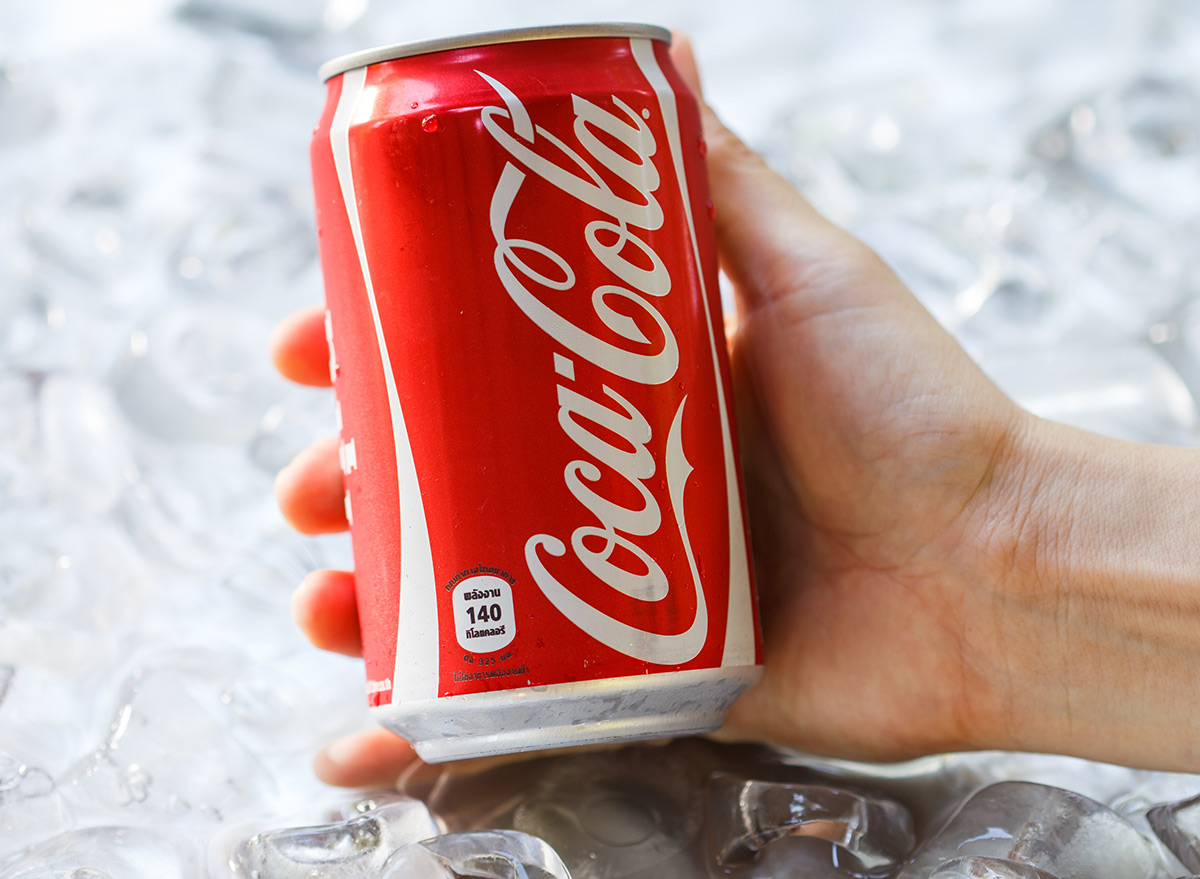
Can drinking a lot of soda every day lead to weight gain? Sure. Is being overweight associated with fatty liver disease? Yes. No wonder your dietary habits are a prime driver of developing metabolic syndrome, type 2 diabetes, and non-alcoholic fatty liver disease. All are related to the Western diet pattern of increased consumption of simple sugars like glucose and high fructose corn syrup. And it's showing up most dramatically in kids. Nonalcoholic fatty liver disease is the most common liver disorder in children and has doubled over the past 20 years, according to the American Liver Foundation. Researchers have hypothesized that fructose and high fructose corn syrup may predispose someone to fatty liver infiltration by creating an adverse metabolic profile.
In 2015, researchers from Tufts and Harvard universities linked regular drinking of sugar-sweetened beverages with a higher risk of fatty liver disease, particularly in overweight and obese people. The study analyzed both sugar-sweetened beverage and diet drink consumption using food frequency questionnaires from participants in the Framingham Heart Study. The researchers determined that drinking one or more sugary drinks correlated with an increased risk of non-alcoholic fatty liver disease but that drinking diet beverages did not. (Other studies, however, have linked diet beverages to NAFLD.)
Related: Popular Foods That May Cause Lasting Damage to Your Gut.
Diet Coke
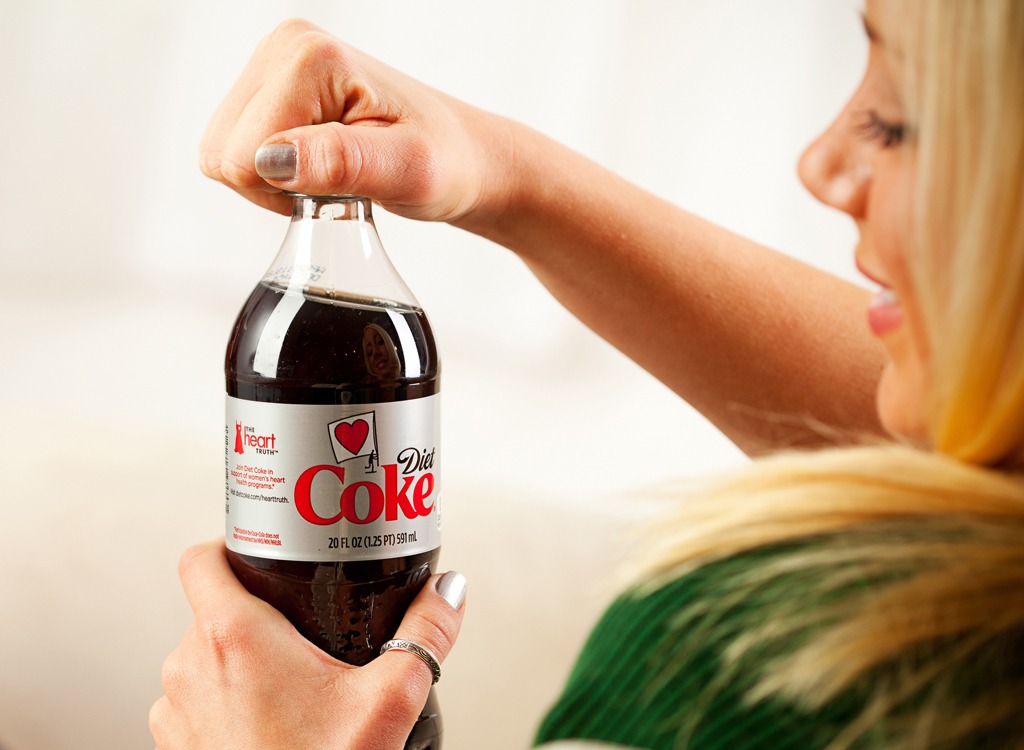
Fructose is not the only risk factor for liver disease, according to researchers reporting in The Canadian Journal of Gastroenterology in 2008. The study followed people who drank regular Coca-Cola, Diet Coke, and sweetened fruit beverages. It and added to the growing body of research connecting sugar-sweetened beverages with fatty liver disease, but this study noticed something different: 40% of the people in the study drank Diet Coke sweetened with aspartame, not sugar or HFCS. The researchers note that aspartame is metabolized by the liver to form chemicals, including methanol, which disrupt mitochondria and may contribute to the accumulation of fat.
Here's One Major Effect of Drinking Diet Soda Every Day, Says Science.
McDonald's Chocolate Shake
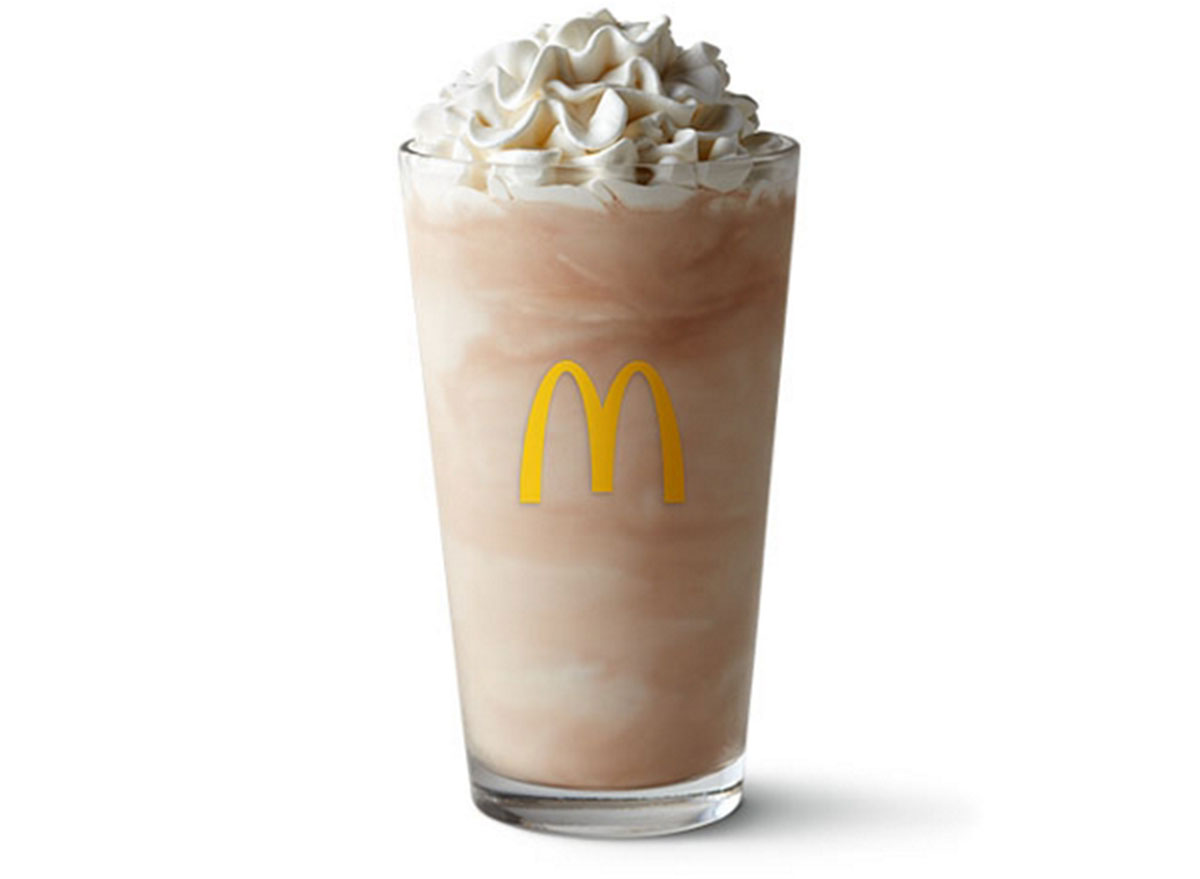
The sugar content of milkshakes and hot chocolates alone should put those drinks in your crosshairs, but nutritionist Andrea Ovard, RD, a sports dietetics specialist with IdealFit, points out another correlation to fatty liver.
"Too much sugar processed in the liver is usually associated with excess calorie intake," says Ovard.
Is a chocolate shake your go-to order with your McDonald's cheeseburger and fries? Even before you get to count the fat and calories in the burger and French fries, a medium chocolate shake saddles you with 81 grams of sugars and 16 grams of fat (18 grams saturated) in its 620 calories. Knock that out for your liver's sake by ordering an unsweetened iced tea instead.
Smoothie King "The Hulk" Strawberry Shake
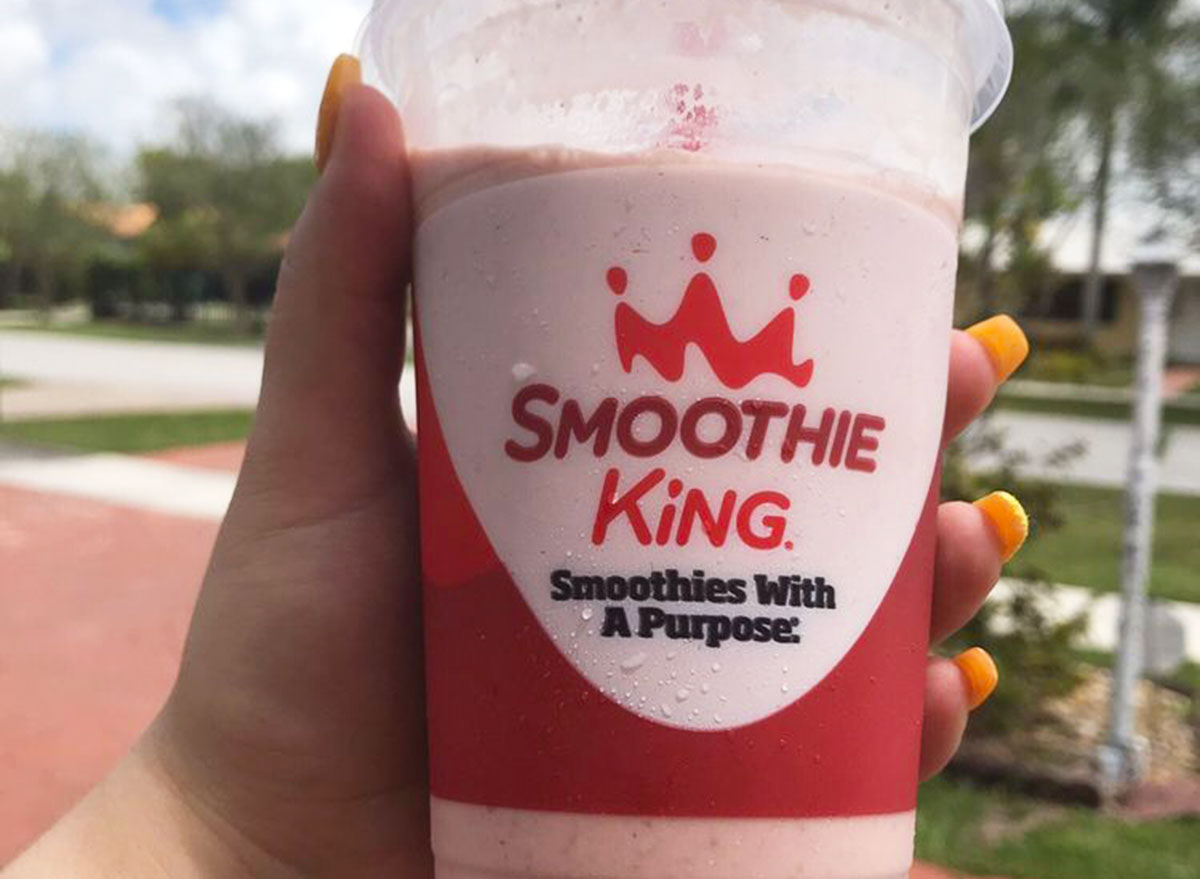
Smoothie King calls this a "strength and recovery" shake on its website alongside a photo of a dude doing a pullup. Make a regular habit of "The Hulk" and you may not be able to do a pullup. "The Hulk" delivers a gut punch to your liver with an enormous amount of added sugars, 183 grams, or the equivalent of eating 26 Tate's Chocolate Chip Cookies. We're talking the large 40-ounce version, but why would you order anything smaller of The Hulk? What's more, you get 1,770 calories in that "recovery" smoothie and 32 grams of saturated fat or four and a half Burger King Bacon Cheeseburgers' worth.
Get even more healthy eating tips straight to your inbox by signing up for our newsletter!
Beer, Wine, and Liquor

Even moderate drinking may end up negatively affecting your liver because alcohol increases levels of triglycerides, a type of blood fat. Beer, wine and cocktails are high in calories and, in your body, any calories that you don't use immediately for energy are converted to triglycerides. The accumulation of triglycerides in your liver that don't get used can lead to non-alcoholic fatty liver disease.
A Korean study followed nearly 60,000 young and middle-age adults with non-alcoholic fatty liver disease for 8 years and identified those whose disease had progressed. It turned out that those who were moderate drinkers were 29% more likely to have worse fibrosis or scarring on the liver.
Another study in JAMA analyzed cases of alcohol-related liver disease from 2001 to 2018 and found that severe cases were on the rise, primarily in younger adults. The increasing deaths from alcoholic cirrhosis were driven largely by binge drinking among people aged 25 to 34 years, the researchers found.
Binge drinking for men is defined as consuming five or more drinks within two hours and, for women, four drinks within two hours. The American Liver Foundation defines heavy drinking as six drinks a day and says that almost anyone who has more than that will almost certainly have alcoholic fatty liver disease, and up to 20% of them will have cirrhosis.
"We are told that alcohol is good for the heart and therefore good for our health," says Dr. Sears. "This is great news for the alcoholic beverage industry, but not so true for the rest of us. Alcohol is a toxic substance."
